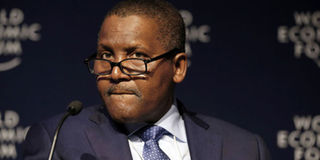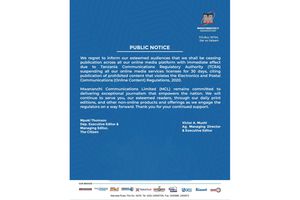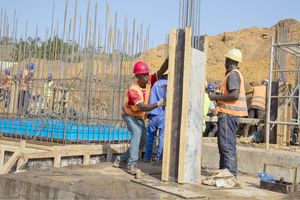Coal debate lingers despite Dangote's assurance to JPM

The owner of the Mtwara-based Dangote cement factory, Mr Aliko Dangote, says he is against his company’s decision to import coal and gypsum for use at the factory.
What you need to know:
- According to Africa’s richest man, importing goods that are locally available amounts to importing poverty into Tanzania and exporting jobs outside the country, adding that his company is not going to be part of that.
Dar es Salaam. The owner of the Mtwara-based Dangote cement factory, Mr Aliko Dngote, says he is against his company’s decision to import coal and gypsum for use at the factory.
According to Africa’s richest man, importing goods that are locally available amounts to importing poverty into Tanzania and exporting jobs outside the country, adding that his company is not going to be part of that.
“We will utilise whatever we have locally, and already we have been assured of getting the amount of coal that we want…I also gave the President my firm commitment for further investments, and we are looking into other areas like agriculture and coal,” the Nigerian billionaire said after holding talks with President John Magufuli at State House on Saturday.
President Magufuli reiterated at the meeting what his ministers had been saying in the wake of the controversy surrounding cement manufacturers’ energy needs.
“It is unthinkable for the country to allow the importation of coal while quality stocks that can last for over 200 years are available,” he said.
However, Mr Dangote’s assurance did little to dismiss concerns on the quality and quantity of local coal, which were recently revealed by a government-commissioned report.
Dangote Cement country manager Harpeet Duggal said in October that the plant had to switch to diesel after the government banned importation of coal from South Africa, adding that they could not use local coal because it was of “poor quality”.
The government last year appointed a five-member committee chaired by Dr Augustine Hangi, and the team concluded in its report compiled between August and September 2015 that local coal is of “poor and/or fluctuating quality”.
Executives of two other cement factories who spoke to The Citizen over the weekend said the quality and availability of locally mined coal were worse now than at the time when the study was conducted.
“Back then there was no ban on imported coal so we had options and ways to balance both the quality and supply chain, but now we have no alternatives. To make matters worse, our concerns on local coal have not been addressed,” said one of the executives on condition of anonymity. According to the study, the quality of local coal is compromised since Tancoal, the only active coal producer in the country, lacks a processing plant needed to produce coal of consistent quality demanded by the market.
There is also the issue of protecting coal from rain at Kitai stockpile yard. Rainwater increases the moisture content in coal, which is not acceptable to customers if it exceeds eight per cent.
“A washing plant roughly costs about $2 million, and once installed it will provide the best quality coal. It should be understood that cement manufacturers in the country have injected hundreds of millions of dollars in building and expanding their plants,” the executive said, adding, “It’s only fair for these companies to look for quality materials. We don’t buy coal just for the sake of buying it...we are after energy within coal, and washed coal is the best.”
He said Tancoal had yet to expand its machinery capacity, and it is a challenge to cater for all manufacturers, adding that “if Dangote will really resume buying local coal then the situation will worsen”.
The situation at Kitai stockpile yard, which has a holding capacity of 165,000 tonnes, also remains the same.
“On Thursday last week it rained cats and dogs and about 30 to 40 loaded trucks were stranded for a whole day on a three-kilometre stretch of a muddy road between the yard and the main tarmac road...definitely, in such a situation transportation costs rise sharply,” another executive, who also wished to remain anonymous, told The Citizen.
He also noted that the government was wrong to compare prices of coal from Tanzania and South Africa and concluding that the latter is expensive.
“Yes, South African coal might be expensive by about $15 to $25 per tonne by the time it reaches a plant depending on location, but that is washed coal and is therefore of reliable quality.”
He said all they were pressing for is for the government to push Tancoal to address the challenges and make their product marketable.
“If we were against local coal we wouldn’t have invested here in the first place...we’re only pushing for quality and reliable supply.”
Tancoal is a joint venture between National Development Corporation of Tanzania (NDC), which has a 30 per cent stake, and Intra Energy (Tanzania) Limited (IETL), with 70 per cent.
Reached for comment, IETL executive director Mark McAndrew said he was travelling and referred this reporter to NDC.
NDC managing director Mlingi Mkucha said the matter was being “grossly exaggerated”.
“If we talk about quality, Tirdo (Tanzania Industrial Research and Development Organisation) analysed local coal and established that it is of a high quality and doesn’t need to be washed to improve its quality.
“People are also calling for a shed to be built at Kitai stockpile yard. That is not necessary. I have been to stockpiles in Australia and South Africa...they don’t do that. Even at the Richards Bay Coal Terminal in South Africa, where they (cement manufacturers) buy coal, there are no sheds. When it rains, the stock is covered by tarpaulins.”
Mr Mkucha said the real challenge was on transportation, adding that a feasibility study had already been conducted to link coal mines in the Southern Highlands to Mtwara by road and railway and funds were being mobilised for the projects.
Tancoal sold 35,370 tonnes of coal in November compared with 29,767 tonnes in October after the government restricted imports.
Mr Mkucha said sales were projected to hit 45,000 tonnes this month.




